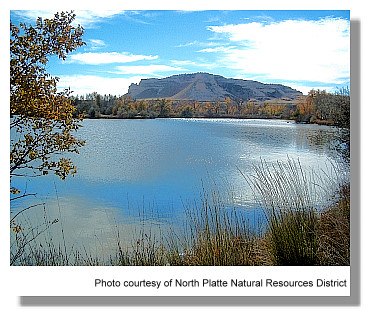| NDEE Water Programs |
| Nebraska Water Quality: |
| A Brief Overview |
| The goal of the Water Quality Programs is to protect
surface and groundwater resources in Nebraska. |
Nebraska has some of the best water resources in the nation and the world.
Groundwater (located beneath the state’s surface in porous regions known as
aquifers) could cover the state with nearly 40 feet of water if it were all
pumped to the surface. Because groundwater is so plentiful and reliable,
85% of the state’s population uses groundwater as drinking water.
Nebraska’s surface water resources are surprisingly extensive, including
approximately 18,000 miles of continuously flowing rivers and streams and
about 430 square miles of lakes.
|
 |
|
Wildlife, including many native fish species,
rely on Nebraska’s streams for survival and
prosperity.
|
Many challenges face Nebraskans when trying to protect this valuable resource.
Runoff from rain and irrigation can carry chemicals and topsoil into streams
in both urban and rural areas, causing surface water contamination. More than
50 years of crop production has allowed fertilizers and ag chemicals to reach
groundwater in parts of the state, causing contamination.
|
Water Quality Programs
Groundwater -- The Groundwater programs include the Groundwater Management area
Program, Underground Injection Control, Mineral Exploration and Wellhead
Protection. The program also issues an annual report to the Legislature
concerning groundwater quality in Nebraska, and is responsible for
hydrogeologic review of various Department programs.
Petroleum Remediation -- The Petroleum Remediation Program involves two inter-related
program areas: overseeing the investigation and cleanup of petroleum
contamination resulting from leaking above-ground and underground
storage tanks; and administering financial assistance for persons
responsible for investigation and cleanup costs due to petroleum
releases from tanks.
Surface Water -- The Surface Water Monitoring and Assessment programs collect
physical, chemical, and biological water quality samples from streams
and lakes, implements surface water improvement projects, and prepare
surface water quality reports.
Planning
-- The Water Quality Planning Unit is involved with multiple
programs, including:
Water Quality Permit Programs
Agriculture -- The Agriculture Section’s programs consist of the Livestock Waste
Control Program, the Chemigation Program and the Agricultural Chemical
Containment Program.
State Revolving Fund (SRF) Section -- NDEE, in coordination with the Nebraska Department of Health and Human
Services Division of Public Health, distributes funds from two major
revolving loan fund programs. These two programs – the Clean Water State
Revolving Loan Fund (for wastewater treatment facilities) and the Drinking
Water State Revolving Loan Fund.
Wastewater -- The Wastewater Section administers the construction permit program for new
and modified wastewater treatment facilities and collection systems built in
the state.
Permitting -- All persons discharging or proposing to discharge pollutants from a
point source into any waters of the state are required to apply for and have
a permit under the National Pollutant Discharge Elimination System (NPDES) to
discharge including all significant industrial users discharging to a
publicly owned treatment works.
Water Quality Publications |